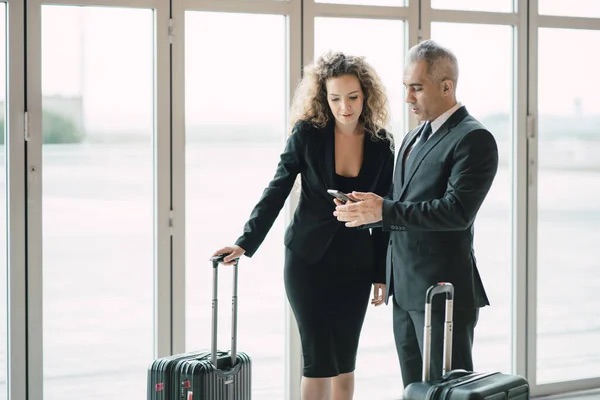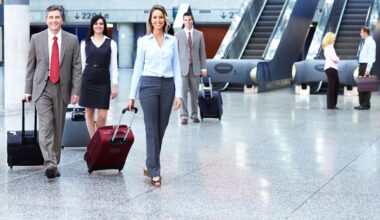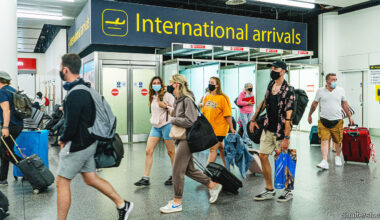We’ve all had that moment at work when a colleague or client is heading out on a trip, and we want smart and professional ways to say safe travels at work to them. Saying “safe travels” is the go-to, but sometimes it feels a little too casual, especially in professional settings.

The good news? There are plenty of polished alternatives that strike the right balance between warmth and professionalism. Whether you’re writing an email to your boss, sending off a client, or chatting with teammates, here are smart, professional ways to say safe travels at work.
Why It’s Important to Say, “Safe Travels” Professionally

Wishing someone well before they travel might seem like a small gesture. But in the workplace, small things often leave the biggest impact. Choosing professional ways to say safe travels shows that you care while keeping your message polished and respectful.
1. It shows courtesy
A polite farewell communicates that you value the person. Whether it’s a client, your boss, or a teammate, a thoughtful phrase sets the right tone.
2. It creates a positive impression
Managers, clients, and colleagues notice the details. Using professional alternatives instead of casual phrases can highlight your attention to respect and professionalism.
3. It strengthens workplace bonds
When teammates feel supported, it builds trust and connection. A simple, warm travel wish can boost morale before someone heads out for a trip.
4. It maintains professionalism
Even casual goodbyes can be polished. Instead of sounding stiff, professional travel wishes keep communication friendly yet respectful.
In short, how you say goodbye matters. Using professional travel phrases like “Have a safe and pleasant trip” or “Wishing you a successful journey” helps you balance warmth with professionalism in the workplace.
20 Professional Ways to Say Safe Travels

Finding the right words matters, especially in a workplace setting. Below are professional ways to say safe travels with notes on when to use each.
Polite and Formal (For Managers or Clients)
- “Wishing you a secure journey.” Works well in emails to senior staff.
- “May your travels be smooth and secure.” Ideal for business-related trips.
- “Have a safe and pleasant trip.” A balanced, polite choice.
- “Wishing you a trouble-free journey.” Good for professional yet caring communication.
Supportive (For Colleagues and Team Members)
- “Safe travels and a successful trip.” Encourages and motivates.
- “Bon voyage, stay safe.” Warm, but still professional.
- “May your journey be secure and enjoyable.” Friendly and polite.
- “Travel safely and take care.” A caring yet simple option.
Warm Everyday Wishes (For Casual Office Goodbyes)
- “Wishing you a journey filled with safety and comfort.” Great for colleagues going on leave.
- “Safe travels and a wonderful trip.” Adds warmth to your message.
- “Have a secure and happy journey.” Polite, light, and professional.
- “Travel well and arrive safely.” Simple for face-to-face goodbyes.
Encouraging and Motivational (For Work Trips)
- “May your trip be free from any mishaps.” Shows thoughtfulness.
- “Wishing you a journey without any hitches.” Great before conferences or projects.
- “Safe journey and enjoy your time away.” Encourages balance between work and rest.
- “Safe travels and a successful expedition.” Best for big work assignments.
Friendly Yet Professional (For Returning Colleagues)
- “Travel with safety and peace of mind.” Warm but polished.
- “May your travels be accident-free.” Short and clear.
- “Wishing you a secure and uneventful trip.” Professional and respectful.
- “Travel safely and come back refreshed.” Perfect for teammates on vacation.
When to Use Each Phrase at Work
Knowing professional ways to say safe travels is one thing. Using them in the right context is another. Here’s a simple guide to help you pick the right phrase for any workplace situation.
1. Emails to Clients or Managers
When writing to clients, supervisors, or senior staff, stick to formal and polished language. Phrases like “Wishing you a smooth and secure journey” or “Have a safe and pleasant trip” show respect and professionalism. These small touches leave a positive impression and highlight your attention to detail.
2. Team Members Traveling for Work
For colleagues heading out on business trips, use supportive and encouraging expressions. “Safe travels and a successful trip” or “Travel safely and take care” are perfect. These phrases show you care while keeping the tone professional and motivating.
3. Casual Office Goodbyes Before Holidays
When saying goodbye before leave or a holiday, warm, everyday phrases feel natural. Expressions like “Wishing you a journey filled with safety and comfort” or “Travel well and arrive safely” are friendly yet polished.
Using the right phrase in the right situation ensures your farewells are thoughtful, professional, and easy to remember. Mastering these professional travel phrases makes workplace communication smoother and more meaningful.
Tips for Using Travel Wishes in the Workplace

Sending a travel wish at work doesn’t have to be complicated. Using professional ways to say safe travels can be simple, thoughtful, and effective if you follow a few easy tips.
1. Keep It Short and Clear
Long, complicated messages can feel stiff. Stick to short, polite phrases like “Have a safe and pleasant trip” or “Travel safely and come back refreshed.” Clear messages are easier to read and remember.
2. Add Context When Needed
If someone is traveling for a meeting, project, or conference, personalize your message. For example: “Safe travels to the conference in Accra—wishing you a productive trip!” Small details show you’re paying attention.
3. Match Your Tone
Consider your relationship with the person. Use formal phrases for clients or managers, supportive ones for teammates, and warmer expressions for casual office goodbyes. Matching the tone keeps your message professional and genuine.
4. Avoid Slang or Overly Casual Words
Phrases like “Have a blast, bro” or “Safe trip, dude” don’t belong in professional emails or meetings. Stick with polished, respectful wording.
Following these tips ensures your travel wishes are polite, practical, and professional, helping you maintain strong workplace relationships while showing care and thoughtfulness.
Conclusion
Using professional ways to say safe travels is more than a polite gesture, it shows respect, thoughtfulness, and professionalism in the workplace.
Whether you’re emailing a client, sending off a teammate, or saying goodbye to a co-worker before a holiday, choosing the right phrase strengthens relationships and leaves a positive impression. Remember to match your tone, keep messages clear, and personalize when possible.
Start incorporating these polished travel wishes into your daily communication and watch your workplace interactions feel warmer, smoother, and more professional. Make every farewell count.







